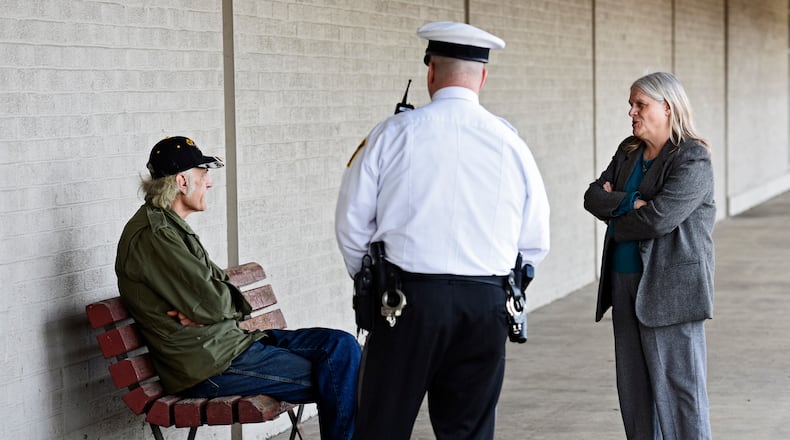The idea is for the officers to learn how to calm a person in crisis down and then, if transporting them somewhere is required for safety reasons, knowing where to take them.
Some officers — in the sheriff’s office, Fairfield, Hamilton, Middletown, Monroe, Oxford and West Chester Twp. to name a few — have already received some mental health training, but Butler County NAMI Executive Director Rhonda Benson said that isn’t enough.
“Even though these people are trained they’re not trained to our resources,” Benson told the Journal-News. “They have the training, they have de-escalation skills and they’ve probably had the ridealongs with case managers that are part of the program and all that kind of stuff, but they’ve not actually gotten an education about the resources in our county.”
Mental health experts like Kathy Becker have been training police officers in various departments since 1993, but there has not been a comprehensive, countywide training course.
Retired Akron Police Lt. Mike Woody, who started the first CIT program in the state, last week helped a steering committee get the program started in Butler County.
“I think going through the course, it calms the officers down enough that for the most part you’re not going to overreact in these type of situations,” Woody said. “They are still going to maintain sort of their combat-ready status because they are not foolish, but you can conceal it a little bit, you can get some things accomplished when you realize this is an illness.”
Since CIT has been operating in Akron 5.4 percent of the contacts with mentally ill people in crisis resulted in arrests, compared to the 7.9 percent arrest rate in Summit County four years before CIT was introduced.
Grants are covering the cost of the $10,000 bi-yearly, 40-hour training, according to Benson.
“The passion is there to do this, but we also want to have the inter-agency collaboration with everybody in the county,” said West Chester Police Officer Keith Beal, who is on the steering committee for Butler County’s CIT program. “To get a first class going with 20 officers, I don’t think there’s going to be a problem with that.”
MORE: Those in mental health crisis now have a new way to get help
Butler County Sheriff’s Chief Tony Dwyer said they already have intensive training in this and many other areas but they would likely pick deputies from various areas of their operation to participate in the class, so they can have an expert or two always available to take these kinds of calls.
“Would we consider that valuable training? The answer is yes,” he said. “If you have trained personnel throughout the entire agency, you identify those resources when you have an incident that requires that type of response, then you try and direct those people to those types of calls.”
Middletown City Manager Doug Adkins said the city’s police department already does similar training in this area but they always welcome additional opportunities.
Fairfield Police Chief Steve Maynard and Oxford Chief John Jones both said their departments have had CIT training previously, but more training is always better.
“Any type of crisis intervention training, as long as it’s done appropriately, we’d certainly participate in it,” Maynard said.
Likewise, Monroe Police Chief Bob Buchanan said his department has been sending officers to Warren County for CIT training since 2014. Thirteen officers are currently trained, he said, but the goal is to send the entire department through these classes.
“The Monroe Police Department has found the information and techniques learned in CIT training to be an invaluable part of our approach to identifying and helping those we come in contact with who are experiencing an mental health crisis,” Buchanan said, adding it has given them de-escalation techniques and “a network of resources and community partners to assist in obtaining help and services for the individual.”
In Hamilton, Sgt. Paul Davis said because the department is located in the county seat it routinely encounters these types of situations
While the department’s officers have received training similar to what NAMI is proposing, he said, “you can never have too many resources.”
“If it’s something we have not already had, we’d definitely look into it,” he said.
About the Author
